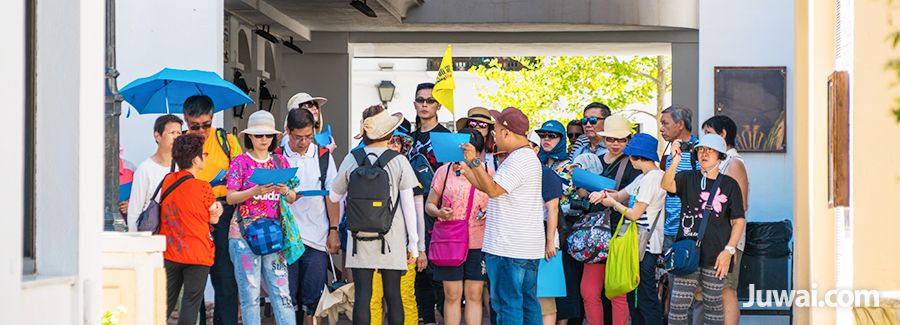You've successfully copied this link.
Golden Week 2017: get set for a Chinese outbound splurge

710 million Chinese tourists will be on the move this National Day Golden Week, up 10% y-o-y.1
Buoyed by China’s consumer-driven travel boom, the upcoming 2017 October Golden Week – which runs from 1-8 October 2017 – already promises to be exceptional.
For starters, the October Golden Week coincides with Mid-Autumn Festival this year. That means mainland Chinese will be enjoying eight days of public holidays instead of the usual week-long break, thus contributing to the 10% increase in projected Chinese travellers.1
Secondly, more than 6 million Chinese are expected to travel overseas during this period2 – yet another unprecedented number driven by the burgeoning wanderlust among mainland Chinese, particularly with China’s millennials that currently number around 400 million.3
Thirdly, this Golden Week promises to be a sales bonanza because Chinese consumers’ buying confidence is at its highest point for more than two decades, bolstered by a strong job market and robust income growth.4
The official China Consumer Confidence Index hit 114.6 in July, its highest point in over 20 years.4
Countries vying for Golden Week Chinese travellers
Already, Golden Weeks of the past have been nothing short of a sales windfall for countries all over the world, with businesses in Japan and the UK raking in an estimated $830 million and $770 million, respectively, during the 2015 Golden Week period.
Even China UnionPay, China’s answer to Visa, has recently joined the fray to capitalise on Golden Week – UnionPay added thousands of payment terminals all over the world during the past year5, and is running a Special Offers Program that give its users discounts in Hong Kong, special offers in the US, and automatic tax refunds in 38 countries across the globe.
Alipay – Alibaba’s own Paypal-esque system and a favourite for China’s online retail-obsessed buyers – hasn’t been slacking either. Alipay is now available in 70 countries6 and handling some 14 different currencies, making it much easier for Chinese to shop till they drop at just about anywhere in the world.
Clearly, this peak outbound travel period is also a window of opportunity that international agents and professionals targeting the Chinese market must not miss out on.
Chinese spent $5.07 trillion on retail alone last year7 – a clear indication of their colossal spending power, which over 6 million Chinese will be taking this spending power abroad this Golden Week. The biggest question, though, is which countries will benefit from this Chinese-driven sales bonanza?
While popular vacation hotspots, including Thailand, Japan, and the US will undoubtedly be on the receiving end, let’s not forget rising destinations like Vietnam and Morocco, which saw a 419% surge in Chinese arrivals since a visa exemption was launched in June 2016.8
Find out where Chinese travellers are heading to this Golden Week 2017 here.
Golden Week boost to Chinese outbound property investment
More importantly, we project that the National Day Golden Week this year could see that spending power stretch as far as real estate. Here are three reasons why:
#1 Growing incomes, connectivity, and visa access
According to data from the National Bureau of Statistics (NBS), disposable income per household in China rose 7.3% y-o-y in real terms during H1 2017, outpacing China’s GDP growth of 6.9% in the same period.9
As the Chinese earning power continues to grow, so does their spending and investment power. Rising incomes is one of the major factors propelling Chinese abroad, and other countries have been quick to catch on.
Not only are airlines increasingly adding new routes connecting China to global destinations, but governments all over the world are easing visa rules for Chinese as well in their bid to attract more Chinese outbound travellers, many who intend to property hunt while vacationing overseas.
A Juwai survey conducted earlier this year revealed that 57% of Juwai Chinese consumers plan to purchase property in the countries they are travelling to overseas.10
Considering Bloomberg Intelligence predicts Chinese will take nearly 70% more trips abroad in 2020 compared to 20153, this bodes well for property markets and agents worldwide.
#2 Overseas markets offer better value
China’s property market is red hot, and the 20%+ price growth in cities like Shanghai, Beijing, Shenzhen, and Nanjing during 2016 made local property markets look beyond expensive, particularly compared with overseas markets.
With properties in locations like Canada, Panama, Spain, and Vietnam, being roughly between 30% and 60% cheaper than at home, it’s no wonder that mainland homebuyers consider overseas property to be highly attractive options for them from a value perspective.
#3 Domestic restrictions are pushing buyers overseas
Asides from sky-high housing prices, domestic restrictions in China on mortgages, higher taxes and bans on multi-home ownership have also made it harder than ever for Chinese to invest in the domestic property market.
Chinese buyers are even resorting to 'irregular' consumer loans to fund their property ownership dreams, including short-term personal loans like college loans or car loans, says E-House China R&D Institute.11
Faced with such a landscape, it’s easy to understand why more and more Chinese are looking to purchase homes abroad, even in the face of capital controls.
And although some countries have imposed foreign buyer taxes or loan restrictions on foreigners, such as Canada and Australia, mainland property investors have been quick to adapt – many Chinese real estate investors remained unfazed by those restrictions, while others turned to set their sights onto other more affordable picks, such as Southeast Asia, particularly Thailand and Malaysia.
That said, with Golden Week just days away, we hope you’ve already ramped up your efforts and are well-prepared to welcome fly ‘n buy Chinese next week.
From offering Chinese-tailored property tours to utilizing these 10 tips to build trust and rapport with your Chinese buyers, be sure to make the most of what is shaping up to be one of the most lucrative sales seasons this year.


